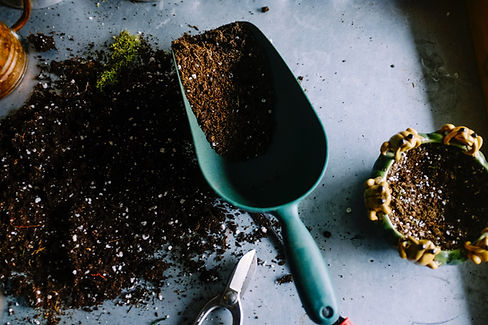Understanding Organic Landscaping
Organic landscaping is a holistic approach to creating and maintaining outdoor spaces that work in harmony with nature. By prioritizing soil health, biodiversity, and sustainable practices, organic landscaping enhances the environment while reducing harmful chemical exposure. When doing things organically, landscapes are easier to manage, it’s better for ecosystem health & for human health.
Soil Health
Healthy soil is the foundation of a thriving landscape. Organic landscaping focuses on enriching soil naturally through composting, mulching, and utilizing organic fertilizers. These methods help retain moisture, encourage beneficial microbial activity, and improve plant growth without relying on synthetic chemicals that deplete soil nutrients over time.
-
Easier to Manage: Healthy soil reduces the need for frequent fertilization and watering, making landscape maintenance more efficient.
-
Better Landscape Health: Rich, organic soil fosters stronger, disease-resistant plants that thrive in their environment.
-
Better for Human Health: Eliminating synthetic fertilizers and pesticides reduces exposure to harmful chemicals for families and pets.


Supporting Pollinators
Pollinators like bees, butterflies, and hummingbirds are essential for a thriving landscape. They help fertilize flowers, leading to better fruit and seed production, increased biodiversity, and a more resilient ecosystem. By supporting pollinators, you create a healthier, more vibrant outdoor space.
-
Increased Crop Yields – Over 75% of flowering plants and many food crops rely on pollinators for reproduction.
-
Stronger Ecosystems – Pollinators support plant diversity, which in turn provides food and shelter for other wildlife.
-
Natural Balance – By promoting pollinators, you reduce the need for synthetic fertilizers and pesticides, fostering a more organic, sustainable landscape.
Why Go Organic?
Switching to organic landscaping is one of the best ways to create a thriving, sustainable outdoor space. By using natural solutions instead of synthetic chemicals, you improve soil health, support biodiversity, and protect the environment while maintaining a beautiful, low-maintenance landscape.
-
Healthier Soil – Encourages beneficial microbes, improves nutrient cycling, and enhances water retention.
-
Safer for People & Pets – Eliminates exposure to synthetic pesticides and fertilizers that can be harmful.
-
Supports Pollinators & Wildlife – Creates a balanced ecosystem that attracts bees, butterflies, and birds.
-
Reduces Water Waste – Organic soil holds moisture better, reducing the need for frequent irrigation.
-
Prevents Pollution – Stops harmful chemical runoff from contaminating local waterways.
-
Stronger, More Resilient Plants – Organically nourished plants develop deeper roots and better resistance to pests and disease.


The Importance of Native Plants
Incorporating native plants into your landscape is one of the best ways to create a thriving, sustainable environment. Native plants are naturally adapted to local soil, climate, and wildlife, making them easier to maintain while supporting biodiversity. They provide essential food and shelter for pollinators, birds, and beneficial insects, helping to restore natural ecosystems. Plus, because they require less water, fertilizer, and pesticides, native plants promote healthier soil and reduce environmental impact.
-
Low Maintenance & Water Efficient – Adapted to local conditions, requiring less watering and upkeep.
-
Supports Pollinators & Wildlife – Provides food, shelter, and habitat for essential species.
-
Improves Soil Health – Deep root systems help prevent erosion, enrich the soil, and enhance water retention.



